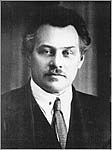Alexei Feodossjewitsch Wangenheim

Alexei Feodossjewitsch Wangenheim ( Russian Алексей Феодосьевич Вангенгейм ; born 10 . Jul / 22. October 1881 greg. In Krapiwna , Ujesd Konotop , Russian Empire , died 3. November 1937 in Sandarmoch , Republic of Karelia , Soviet Union ) was a Russian meteorologist.
Life
Wangenheim was born into a small noble family in the Chernigov governorate . His father was a baron and representative in Zemstvo .
Wangenheim did military service and studied natural sciences at the Polytechnic in Kiev and agricultural sciences in Moscow. In 1906 he married Julia Bolotowa, who had studied history and geography. He began his career as a meteorologist in Port-Petrowsk on the Caspian Sea . During the First World War he was a soldier in the 8th Army . His weather forecasts were used by the Russian army to use poison gas on the front with the Austrian troops .
In the Soviet Union he became a member of the CPSU . In St. Petersburg he headed the Geophysical Observatory and became part of the country's scientific elite. After his divorce he married Varvara Kurgusowa. In 1929 he became director of the Hydro-Meteorological Service of the Soviet Union in Moscow. From 1930 he was one of the two Soviet representatives in the commission for the preparation of the International Polar Year (IPY) 1932/33 and the conference planned for this in Leningrad .
Wangenheim was arrested on January 8, 1934 and sentenced on March 27, 1934 to 10 years in a gulag on the Solovetsky Islands . In the Gulag he worked in the library. On October 9, 1937 he was accused of being a bourgeois nationalist, sentenced to death by a special troika of the NKVD and on November 3, 1937, on the occasion of the 20th anniversary of the October Revolution of 1917, in Sandarmoch in Karelia with a larger group of Inmates shot and buried in a mass grave.
Wangenheim was rehabilitated after the 20th party congress of the CPSU in the course of de-Stalinization on June 23, 1956. A museum in Dmitriev-Lgovsky , of which he was director, was named after him.
Wangenheim wrote letters to his wife and daughter Eleonora (1930–2012), 168 of which have survived. Eleonora was then between four and seven years old. He wrote and drew a kind of reference work for them with detailed descriptions of the flora and fauna, made a herbarium and invented puzzles. Eleonora Wangenheim became a scientist. She donated the legacy of the St. Petersburg human rights organization Memorial , which published some of the letters and drawings in an anthology in 2014 and made it public in the exhibition Papa's Letters - Letters from Fathers from the Gulag to their Children .
Olivier Rolin published the novel Le Météorologue in 2014 , for which he had researched the life of Wangenheim with the support of Memorial since a stay at the University of Arkhangelsk in 2010 , and thus made it known outside of Russia.
literature
-
Olivier Rolin : Le météorologue . In the appendix 16 pages with illustrations from the estate of Wangenheim. Seuil / Paulsen, Paris 2014
- Olivier Rolin: The meteorologist . Novel. Translation by Holger Fock and Sabine Müller. Liebeskind, Munich 2015, ISBN 978-3-95438-049-7
Web links
- История метеослужбы: Вангенгейм Алексей Феодосьевич 9.10.1881 - 3.11.1937 , at meteoweb
- Antonina Soschina: Музей Соловецкого общества краеведения (1925–1937 гг.) , In solovki (Russian)
- Wassili W. Potapow, Eleonora Alexejewna Wangenheim: Возвращение имени. Алексей Феодосьевич Вангенгейм . Tablizy Mendelejewa, Moscow 2005, at memo.ru (Vita and pictures; Russian; pdf; 7.15 MB)
- Entry on Alexei Feodossjewitsch Wangenheim in the Great Biographical Encyclopedia (2009, Russian)
Individual evidence
- ↑ a b c d Cornelius Wüllenkemper: Clouds over the Solowezki Islands , review, in: Süddeutsche Zeitung , August 28, 2015, p. 18
- ^ Cornelia Lüdecke, Julia Lajus: The Second International Polar Year 1932–1933 . In: The History of the International Polar Years (IPYs) (= From Pole to Pole ). Springer, 2010, ISBN 978-3-642-12401-3 , pp. 135-173 , doi : 10.1007 / 978-3-642-12402-0_6 .
- ↑ a b List of the Ukrainians murdered in Sandarmoch No. 25 Wangenheim, on radiosvoboda of November 12, 2012; accessed on September 25, 2018 (Ukrainian)
- ↑ a b Entry on Wangenheim in the Encyclopedia of Modern Ukraine ; accessed on September 25, 2018 (Ukrainian)
- ↑ Дмитриевский государственный краеведческий музей им. А.Ф.Vангенгейма , at museum.ru
- ↑ Eleonora Alexejewna Wangenheim at gulagmuseum.org
- ↑ Inna Parfenowa: Memories of the Father: Letters from the Gulag , review, at Russia Beyond the Headlines , February 6, 2015
| personal data | |
|---|---|
| SURNAME | Wangenheim, Alexei Feodossjewitsch |
| ALTERNATIVE NAMES | Вангенгейм, Алексей Феодосьевич (Russian) |
| BRIEF DESCRIPTION | Russian meteorologist |
| DATE OF BIRTH | October 22, 1881 |
| PLACE OF BIRTH | Krapiwna , Ujesd Konotop , Russian Empire |
| DATE OF DEATH | November 3, 1937 |
| Place of death | Sandarmoch , Republic of Karelia , Soviet Union |

